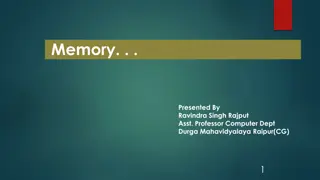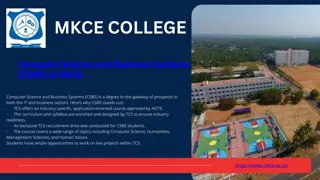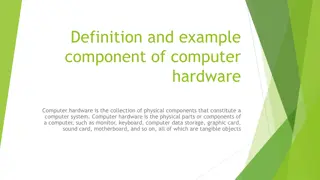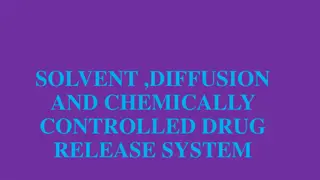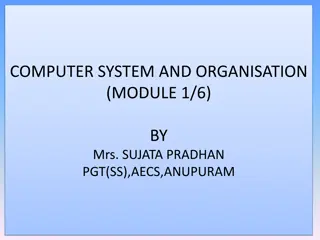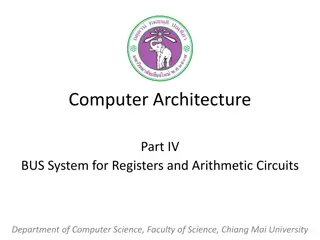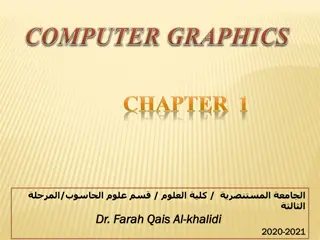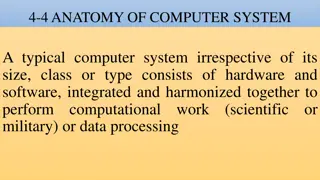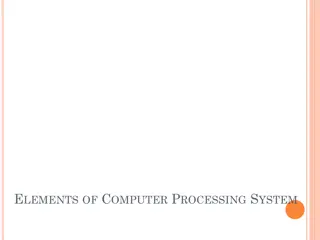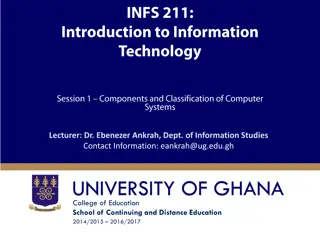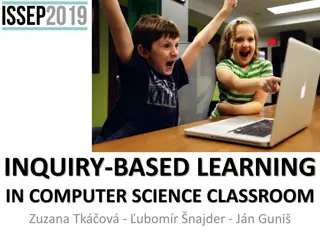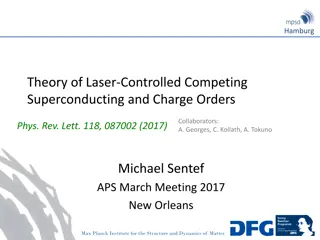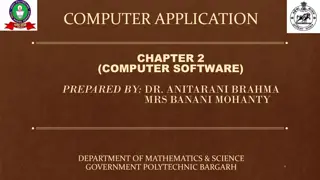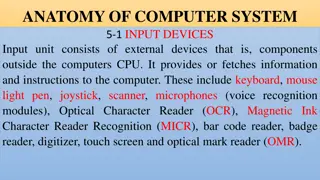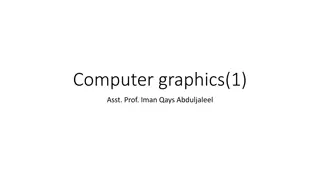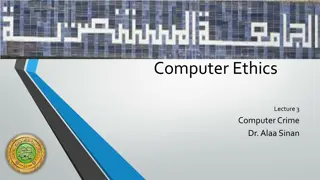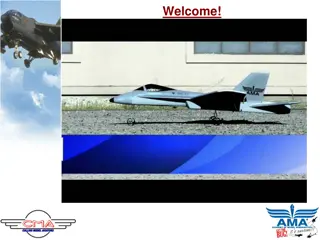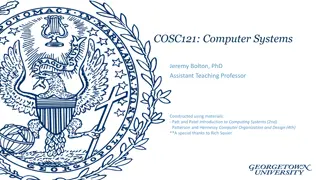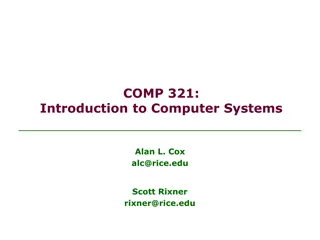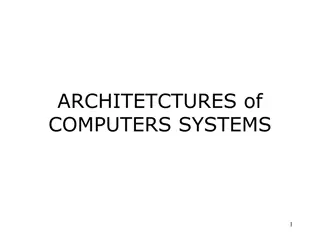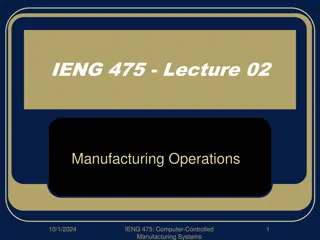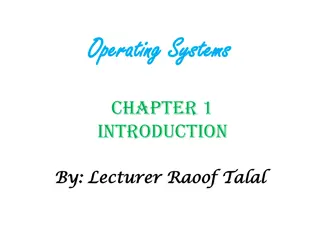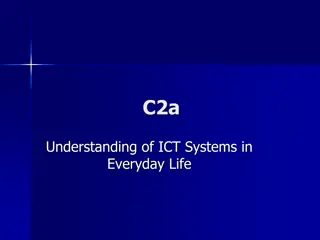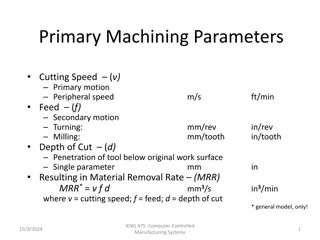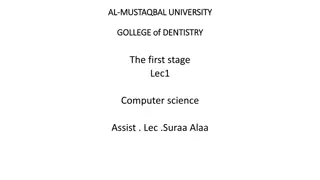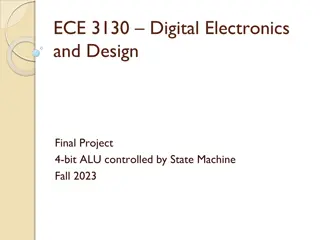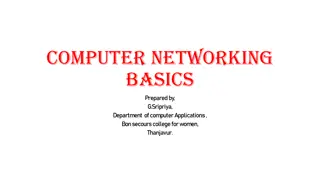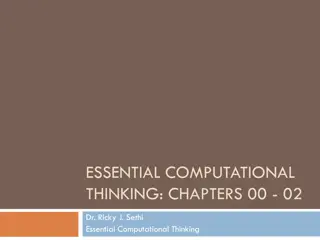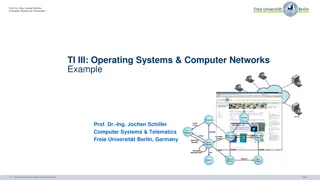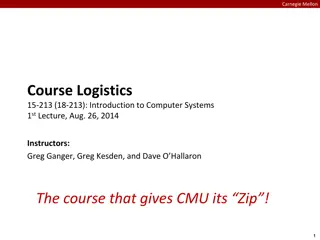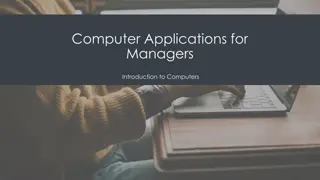Understanding Computer Organization and Architecture
A computer system is a programmable digital electronics device that processes data as per program instructions to provide meaningful output. It comprises hardware and software components, with hardware being the physical parts and software essential for driving the hardware. Computer organization fo
14 views • 71 slides
Understanding Magnetic Disks and Disk Controllers in Computer Memory Hierarchy
Auxiliary memory in computer systems provides additional backup storage through technologies like magnetic disks and tapes. Magnetic disks, which consist of circular platters coated with magnetizable material, offer direct access storage and are controlled by read/write mechanisms and disk controlle
10 views • 42 slides
Principles and Practices of Water Management: Fertigation in Controlled Environments
Fertigation is a cultivation method where complete fertilizer is delivered to crops in solution form through drip irrigation. Basic requirements include greenhouses, drip irrigation systems, clean water supply, pH and EC adjustment tools, and suitable nutrient concentrations. Effective water managem
4 views • 10 slides
Understanding Information Systems in Organizational Management
Management in organizations is divided into three levels: operational, tactical, and strategic. Each level requires different information systems to support various activities. Operational systems focus on routine transactions and control processes, while middle-level systems aid in semi-structured
9 views • 39 slides
Computer Science and Business Systems (CSBS) at MKCE
Computer Science and Business Systems (CSBS) at MKCE\nWelcome to the world of Computer Science and Business Systems (CSBS) at M.Kumarasamy College of Engineering (MKCE), an avant-garde and industry-specific program designed to forge the future leaders of technology and business. Moreover, if you\u20
0 views • 2 slides
Overview of Computer Hardware Components and Software Functions
Computer hardware components such as monitor, CPU, mouse, and projector are essential physical parts of a computer system, while software includes intangible programs like operating systems and utility software. Hardware components perform tasks like displaying data, processing information, and prin
8 views • 9 slides
Polymeric Controlled Drug Delivery Systems
Polymeric controlled drug delivery systems play a crucial role in regulating drug release through diffusion, solvent penetration, and chemical mechanisms. These systems include diffusion-controlled, solvent-controlled, and chemically-controlled devices, each operating based on specific principles. S
0 views • 33 slides
Understanding Computer Architecture and Organization
Computer architecture and organization are fundamental aspects of computing systems. Computer architecture focuses on the functional design and implementation of various computer parts, while computer organization deals with how operational attributes come together to realize the architectural speci
3 views • 40 slides
Understanding Computer System and Organization
Computer Organization involves the logical structure of a computer, defining the interconnections of components for optimal performance. Computers process data through an Input-Process-Output cycle, with input, processing, and output units working together. The characteristics of a computer include
1 views • 20 slides
Understanding BUS Systems in Computer Architecture
This article explores the concept of BUS systems in computer architecture, focusing on the efficient transfer of information between registers using a common bus structure. It delves into the implementation of bus systems for multiple-register configurations, such as a bus system for four registers
0 views • 24 slides
Computer Science Department Information and Courses Offered
The Computer Science Department provides information on courses offered for GCSE or BTEC qualifications, specifically focusing on the AQA GCSE in Computer Science. The course equips students with valuable thinking and programming skills essential in the modern workplace, covering key concepts and pr
3 views • 7 slides
Computer Graphics: Evolution and Applications
Computer graphics represent the creation and manipulation of visual information using specialized hardware and software. This field has evolved since the 1950s, enabling diverse applications like entertainment, CAD, education, e-commerce, and computer art. The origins date back to MIT's early displa
1 views • 22 slides
Anatomy of a Computer System: Hardware Components and Functions
A typical computer system consists of hardware and software working together to perform various computational tasks. The hardware components include the central processing unit (CPU), input/output devices, storage units, and the motherboard. The CPU acts as the main brain of the computer, performing
6 views • 6 slides
Understanding Computer Processing Systems
Computer processing systems consist of various components such as the control unit, ALU, input unit, CPU, output unit, memory, and more. Input devices feed raw data to the computer, while output devices provide processed information. The CPU plays a crucial role in executing instructions and data pr
0 views • 13 slides
Introduction to Computer Systems: Components, Types, and Functions
This session conducted by Dr. Ebenezer Ankrah covers the essential aspects of computer systems, including hardware components, types of computer systems, and information systems. Students will gain an understanding of the fundamental principles and characteristics of computer systems, enabling them
0 views • 41 slides
**Exploring Inquiry-Based Learning in Computer Science Education**
Inquiry-based learning (IBL) in computer science classrooms focuses on fostering communication, collaboration, decision-making, and problem-solving skills among students. The approach involves students constructing knowledge through independent, active activities based on real-world experiences. How
0 views • 18 slides
Evolution of Algorithms and Computer Science Through History
The history of algorithms and algorithmic thinking dates back to ancient times, with the development of general-purpose computational machines by Charles Babbage in the 19th century marking a significant advancement. The term "computer science" emerged in 1959, encompassing theoretical computer scie
1 views • 39 slides
Laser-Controlled Competing Superconducting and Charge Orders in Transition Metal Dichalcogenides
Hamburg Theory of laser-controlled competing superconducting and charge orders explores the use of lasers to manipulate the ordering mechanisms in transition metal dichalcogenides, leading to ultrafast switching and the induction of new states of matter. This research delves into generic mechanisms
0 views • 13 slides
Understanding Computer Software and Operating Systems
Computer software, comprising system software and application software, plays a crucial role in managing computer resources and facilitating user instructions. System software consists of control programs, support programs, and development programs, while application software assists in specific tas
1 views • 26 slides
Overview of Computer Input and Output Devices
Input devices of a computer system consist of external components like keyboard, mouse, light pen, joystick, scanner, microphone, and more, that provide information and instructions to the computer. On the other hand, output devices transfer information from the computer's CPU to the user through de
0 views • 11 slides
Understanding Computer Graphics: An Overview
Computer graphics involves creating images and animations using a computer through hardware and software systems. It has evolved significantly over the years, with advancements in generating various types of computer graphics. Learn about the basics of computer graphics, including digital image repr
0 views • 15 slides
Understanding Computer Crimes and Prevention Strategies
Computer crimes involve illegal acts utilizing computer systems, leading to various consequences. This lecture covers the types of computer system attacks, motives behind computer crimes, costs, prevention strategies, and reflection on the discussed topics. It emphasizes the increasing scope of comp
1 views • 20 slides
Proposal for Radio Controlled Model Aircraft Site Development
To establish a working relationship for the development of a site suitable for radio-controlled model aircraft use, the proposal suggests local land ownership with oversight from a responsible agency. Collins Model Aviators is proposed as the host club, offering site owner liability insurance throug
0 views • 20 slides
Information Systems in Organizations: Overview and Implementation
Information systems play a crucial role in organizations, encompassing transaction processing systems, functional area information systems, and enterprise resource planning systems. This content delves into the purpose of transaction processing systems, the support provided by information systems ac
0 views • 30 slides
Understanding Control Systems for Optimal Occupant Comfort
Explore the essentials of control systems for maintaining occupant comfort, covering topics such as sensors, feedback loops, controlled devices, operational differences between pneumatic and electric actuators, and various types of control systems including pneumatic, electric, analog, and digital.
0 views • 22 slides
Understanding COSC121: Computer Systems and Assembly Language Programming
Delve into the world of COSC121 led by Assistant Teaching Professor Jeremy Bolton, PhD. Explore essential topics in computer systems, assembly language programming, and hardware design. Get hands-on experience with programming in LC-3, understanding machine language, and writing assembly code. Enhan
0 views • 29 slides
Introduction to Computer Systems - COMP.321 Overview
This course provides an in-depth understanding of computer systems, focusing on programming, exceptions, memory, I/O, networking, and system classes. Students learn about computer architecture, compilers, operating systems, and security. With a blend of theory and practical applications, the course
0 views • 21 slides
Understanding Computer Systems Architectures and Standards
Open systems, standards, client-server models, and internet functionality are crucial components of computer systems architectures. Open systems promote interoperability, standards ensure technical criteria, client-server models define coordination, and the internet provides a communication infrastr
0 views • 34 slides
Computer-Controlled Manufacturing Systems Overview
This document outlines the schedule and details for the IENG 475 course on Computer-Controlled Manufacturing Systems. It includes lab schedules, team assignments, lab procedures, and project documentation guidelines. Students are required to attend labs on time, complete assignments, and maintain a
0 views • 19 slides
Understanding Operating Systems: An Introduction and Overview
An operating system is a crucial program that manages computer hardware and serves as an intermediary between users and hardware. This chapter explores the role of operating systems in a computer system, covering components like hardware, application programs, and users. It delves into how operating
0 views • 16 slides
Understanding ICT Systems in Everyday Life
Explore the basic components of a computer system, including the processor, internal memory, input/output devices, and storage, with a focus on how computer systems function in daily life. Learn about computer monitors, the role of operating systems, RAM and ROM memory types, cache memory, and how c
0 views • 130 slides
Machining Parameters and Calculations for Computer-Controlled Manufacturing
Understanding primary machining parameters such as cutting speed, feed rate, and depth of cut, along with operational aspects like turning, milling, and drilling. Exploring machining calculations including spindle speed, feed rate, and material removal rate for efficient computer-controlled manufact
0 views • 13 slides
Overview of Computer Science at Al Mustaqbal University College of Dentistry
Al Mustaqbal University College of Dentistry offers courses in computer science, covering topics like data reception, processing, storage, and output. The curriculum includes the study of computers as electronic devices, data and information, computer features, operating systems like Windows, and ta
0 views • 10 slides
Digital Electronics and Design Fall 2023 Final Project: 4-bit ALU Controlled by State Machine
This project involves designing a 4-bit Arithmetic Logic Unit (ALU) controlled by a State Machine. The ALU performs operations such as addition, subtraction, resetting to zero, and holding results based on select signals. The system includes input and output D Flip-Flops (DFFs) with clear pins, MUX
0 views • 14 slides
Understanding Computer Networking Basics and Distributed Systems
Computer networks facilitate the sharing of devices and resources like servers, clients, and data, while distributed systems involve components located on different networked computers communicating to achieve common goals. Types of computer networks include LAN, PAN, MAN, and WAN. Distributed syste
0 views • 17 slides
Understanding the Essence of Computer Science and Computational Thinking
Delve into the fundamentals of Computer Science and Computational Thinking through chapters discussing the nature of science, predictions in physics, and the distinction between Computer Science and Computer Information Systems. Explore the relationships between Math, Physics, and Computer Science i
0 views • 29 slides
Overview of Prof. Dr.-Ing. Jochen Schiller's Computer Systems & Telematics
This content discusses various aspects of computer systems and telematics as taught by Prof. Dr.-Ing. Jochen Schiller at Freie Universität Berlin, Germany. It covers topics such as operating systems, computer networks, network security, and examples illustrating key concepts. The content explains p
0 views • 31 slides
Understanding Embedded Systems and Cyber-Physical Systems
Embedded systems are specialized computer systems embedded within larger systems, such as control systems and car controllers. This lecture covers real-time aspects, applications of Cyber-Physical Systems (CPS), and examples like the Boeing 777/Airbus A380 cockpit. It discusses the design process of
0 views • 22 slides
Carnegie Mellon Course Logistics: Introduction to Computer Systems
Carnegie Mellon University offers the course 15-213: Introduction to Computer Systems, taught by instructors Greg Ganger, Greg Kesden, and Dave O. Hallaron. The course covers essential topics in computer systems and programming, emphasizing practical skills through lectures, labs, and exams. Recomme
0 views • 23 slides
Understanding Computer Applications for Managers
This educational material introduces computer applications specifically tailored for managers, covering basic functions, operating systems, program navigation, file management, and more. It delves into essential computer concepts, hardware components, software systems, security measures, efficiency
0 views • 39 slides

